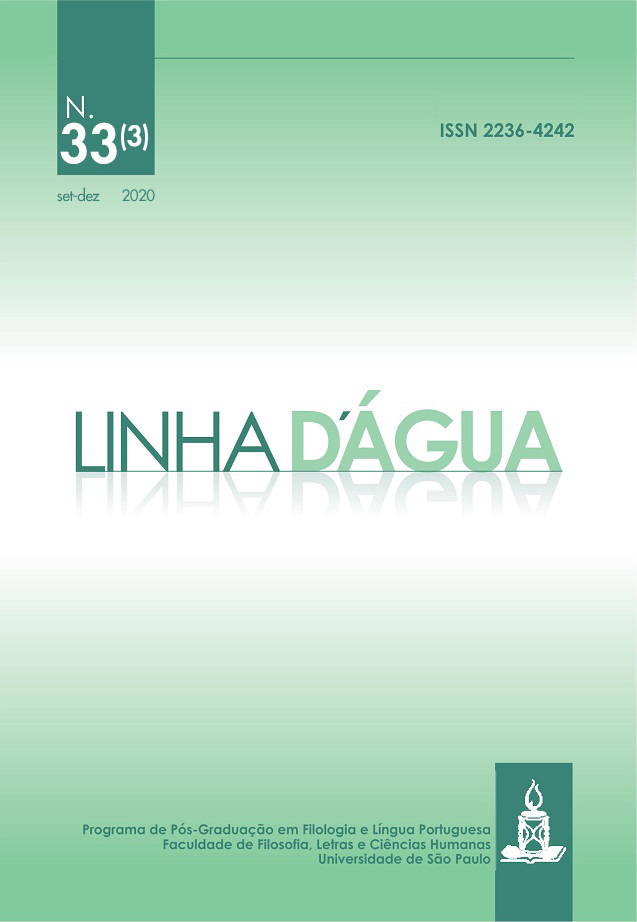The Concept of Great Time and Interpretation of Discourses
DOI:
https://doi.org/10.11606/issn.2236-4242.v33i3p153-174Keywords:
Bakhtin Circle, Discourse, Detachment, Ideology, LiteratureAbstract
The discourse reflects and refracts ideological values that characterize a perspective at the world. The interpretation of literary works also occurs in a similar way. The theme of this work is the interpretations of discourses over time. We chose the Bakhtin Circle as a theoretical basis due to its conception of language, which involves the ideological nature of the linguistic sign, based on the interaction between socially and historically situated interlocutors. Bakhtin assumes that discourses live in great time and break the boundaries of his time. Our aims are: (i) to reflect on the concept of great time applied to the interpretation of discourses; (ii) to discuss the importance of the cultural knowledge of the discourse production for its interpretation; (iii) to analyze how the socio-historical and cultural ideological distance collaborates for the construction of new meanings. We will analyze a social network post related to the tale Snow White and the poem É ela! I É ela! É ela! É ela! by Álvares de Azevedo. The method consists of applying Bakhtinian concepts to the statements. The results show that interpretation involves not only the perception of voices from the context of production of the works, but also the ideological positioning of the reader.
Downloads
References
AZEVEDO, A. de. Lira dos vinte anos. Porto Alegre: L&PM, 1998.
BAKHTIN, M. Notas sobre literatura, cultura e ciências humanas. Tradução Paulo Bezerra. São
Paulo: 34, 2017.
BEZERRA, P. Bakhtin: remate final. In: BAKHTIN, M. Notas sobre literatura, cultura e ciências
humanas. São Paulo: 34, 2017, p. 81-96.
BOSI, A. História concisa da literatura brasileira. São Paulo: Cultrix, 2002.
BRANCA de neve e os sete anões. Provedor Disney Brasil. Direção David Hand, 1965. 1 vídeo
(1:23:57). Disponível em: https://www.youtube.com/watch?v=5UdE4Q-Agag. Acesso em 19
jun. 2020.
GOETHE, J.W. Os sofrimentos do jovem Werther. Tradução Marion Fleischer. Prefácio J.F. Angelloz. 2.Ed. São Paulo: Martins Fontes, 1998.
SHAKESPEARE, W. Othelo, o Mouro de Veneza. Tradução D. Luiz de Bragança.Porto: Lello,
VINGADORES, A CRUZADA DAS CRIANÇAS. Allan Heinberg e Jim Cheung. São Paulo: Salvat, 2016.
VOLÓCHINOV, V. Marxismo e filosofia da linguagem: problemas fundamentais do método
sociológico na ciência da linguagem. Tradução Sheila Grillo e Ekaterina Vólkova Américo. São
Paulo: 34, 2017.
Downloads
Published
Issue
Section
License
Copyright (c) 2020 Cláudio Primo Delanoy

This work is licensed under a Creative Commons Attribution-NonCommercial 4.0 International License.
The Editorial Board authorizes free access to and distribution of published contentes, provided that the source is cited, that is, granding credit to the authors and Linha D'Água and preserving the full text. The author is allowed to place the final version (postprint / editor’s PDF) in an institutional/thematic repositor or personal page (site, blog), immediately after publication, provided that it is available for open access and comes without any embargo period. Full reference should be made to the first publication in Linha D'Água. Access to the paper should at least be aligned with the access the journal offers.
As a legal entity, the University of São Paulo at Ribeirão Preto School of Philosophy, Sciences and Languages owns and holds the copyright deriving from the publication. To use the papers, Paidéia adopts the Creative Commons Licence, CC BY-NC non-commercial attribution. This licence permits access, download, print, share, reuse and distribution of papers, provided that this is for non-commercial use and that the source is cited, giving due authorship credit to Linha D'Água. In these cases, neither authors nor editors need any permission.
Partial reproduction of other publications
Citations of more than 500 words, reproductions of one or more figures, tables or other illustrions should be accompanied by written permission from the copyright owner of the original work with a view to reproduction in Linha D'Água. This permission has to be addressed to the author of the submitted manuscript. Secondarily obtained rights will not be transferred under any circumstance.










